
Tap water is water supplied through a tap, a water dispenser valve. Tap water is commonly used for drinking, cooking, washing, and toilet flushing. Indoor tap water is distributed through "indoor plumbing", which has existed since antiquity but was available to very few people until the second half of the 19th century when it began to spread in popularity in what are now developed countries. Tap water became common in many regions during the 20th century, and is now lacking mainly among people in poverty, especially in developing countries.

Water treatment is any process that improves the quality of water to make it appropriate for a specific end-use. The end use may be drinking, industrial water supply, irrigation, river flow maintenance, water recreation or many other uses, including being safely returned to the environment. Water treatment removes contaminants and undesirable components, or reduces their concentration so that the water becomes fit for its desired end-use. This treatment is crucial to human health and allows humans to benefit from both drinking and irrigation use.
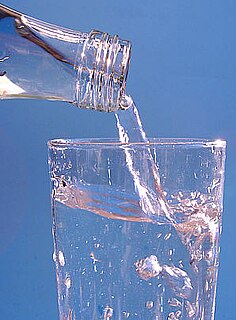
Bottled water is drinking water packaged in plastic or glass water bottles. Bottled water may be carbonated or not. Sizes range from small single serving bottles to large carboys for water coolers.

Water supply is the provision of water by public utilities, commercial organisations, community endeavors or by individuals, usually via a system of pumps and pipes. Aspects of service quality include continuity of supply, water quality and water pressure. The institutional responsibility for water supply is arranged differently in different countries and regions. It usually includes issues surrounding policy and regulation, service provision and standardization.

The water resources of China are affected by both severe water shortages and severe growing population and rapid economic development as well as lax environmental oversight have increased in a large scale the water demand and pollution. China has responded by measures such as rapidly building out the water infrastructure and increasing regulation as well as exploring a number of further technological solutions.

Lake Apopka is the fourth largest lake in the U.S. state of Florida. It is located 15 miles (24 km) northwest of Orlando, mostly within the bounds of Orange County, although the western part is in Lake County. Fed by a natural spring, rainfall and stormwater runoff, water from Lake Apopka flows through the Apopka-Beauclair Canal and into Lakes Beauclair and Dora. From Lake Dora, water flows into Lake Eustis, then into Lake Griffin and then northward into the Ocklawaha River, which flows into the St. Johns River.

Thomas Furneaux Lennon is a documentary filmmaker.
Issues that affect water supply and sanitation in the United States include water scarcity, pollution, a backlog of investment, concerns about the affordability of water for the poorest, and a rapidly retiring workforce. Increased variability and intensity of rainfall as a result of climate change is expected to produce both more severe droughts and flooding, with potentially serious consequences for water supply and for pollution from combined sewer overflows. Droughts are likely to particularly affect the 66 percent of Americans whose communities depend on surface water. As for drinking water quality, there are concerns about disinfection by-products, lead, perchlorates, PFAS and pharmaceutical substances, but generally drinking water quality in the U.S. is good.
Steven Starr is the producer of FLOW: For Love Of Water, and the founder of Revver.
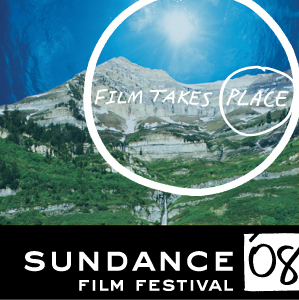
The 2008 Sundance Film Festival ran from January 17, 2008 to January 27 in Park City, Utah. It was the 24th iteration of the Sundance Film Festival. The opening night film was In Bruges and the closing night film was CSNY Déjà Vu.

Water testing is a broad description for various procedures used to analyze water quality. Millions of water quality tests are carried out daily to fulfill regulatory requirements and to maintain safety.

Trouble the Water is a 2008 documentary film produced and directed by Tia Lessin and Carl Deal. The film portrays a young couple surviving Hurricane Katrina, leading them to face their own troubled past during the storm's aftermath, in a community abandoned long before the hurricane hit. It features music by Massive Attack, Mary Mary, Citizen Cope, John Lee Hooker, The Roots, Dr. John and Blackkoldmadina. Trouble the Water is distributed by Zeitgeist Films and premiered in theaters in New York City and Los Angeles on August 22, 2008, followed by a national release in more than 200 theaters. It had its television premiere on HBO and has been rebroadcast on National Geographic Channel and Turner Classic Movies. Trouble the Water is available on DVD.

Water supply and sanitation in Canada is nearly universal and generally of good quality, but a lack of clean drinking water in many First Nations communities remains a problem. Water use in Canada is high compared to Europe, since water tariffs are low and 44% of users are not metered.
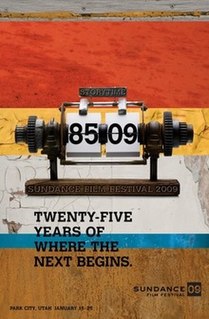
The 2009 Sundance Film Festival was held during January 15, 2009 until January 25 in Park City, Utah. It was the 25th iteration of the Sundance Film Festival.
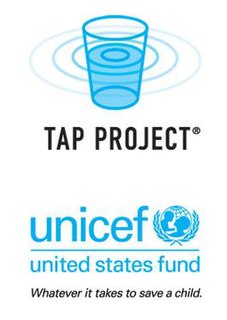
The UNICEF Tap Project was a nationwide campaign that provides children in impoverished nations with access to safe, clean water. The campaign culminated during World Water Week, celebrating the United Nations’ World Water Day, March 22.
Gasland is a 2010 American documentary written and directed by Josh Fox. The film focuses on communities in the United States where natural gas drilling activity was a concern and, specifically, on hydraulic fracturing ("fracking"), a method of stimulating production in otherwise impermeable rock.

Water pollution is a major environmental issue in India. The largest source of water pollution in India is untreated sewage. Other sources of pollution include agricultural runoff and unregulated small-scale industry. Most rivers, lakes and surface water in India are polluted due to industries, untreated sewage and solid wastes.
Tapped is a 2009 documentary film by directors Stephanie Soechtig and Jason Lindsey. The two began the documentary after research into ocean pollution "kept leading them to bottled water".
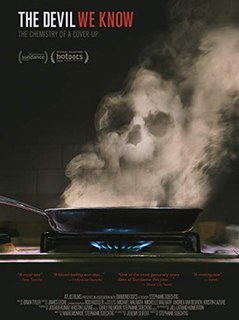
The Devil We Know is a 2018 investigative documentary film by director Stephanie Soechtig regarding allegations of health hazards from perfluorooctanoic acid, the key ingredient in Teflon, and DuPont's potential responsibility. PFAS are commonly found in every household, and in products as diverse as non-stick cookware, stain resistant furniture and carpets, wrinkle free and water repellant clothing, cosmetics, lubricants, paint, pizza boxes, popcorn bags, and many other everyday products. The film premiered at the 2018 Sundance Film Festival. The director, Soechtig, has also produced similar documentary exposés including Tapped (2009), about the pollution caused by bottled water, Fed Up (2014), dealing with the obesity-promoting food industry, and Under the Gun (2016), about the gun lobby. The documentary was also shown on BBC Four in November 2018 as Poisoning America – The Devil We Know as part of the BBC Storyville documentary series. Two of the most common types were phased out of production in the United States (US) in 2002 and 2015 respectively, but are still present in some imported products, and were replaced by the similarly toxic GenX in Teflon products. PFOA and PFOS are found in every American person’s blood stream in the parts per billion range, though those concentrations have decreased by 70% for PFOA and 84% for PFOS between 1999 and 2014, which coincides with the end of the production and phase out of PFOA and PFOS in the US.
Marina Zenovich is an American filmmaker known for her biographical documentaries. Her films include LANCE, Robin Williams: Come Inside My Mind, Richard Pryor: Omit the Logic and Roman Polanski: Wanted and Desired, which won two Emmy awards.















